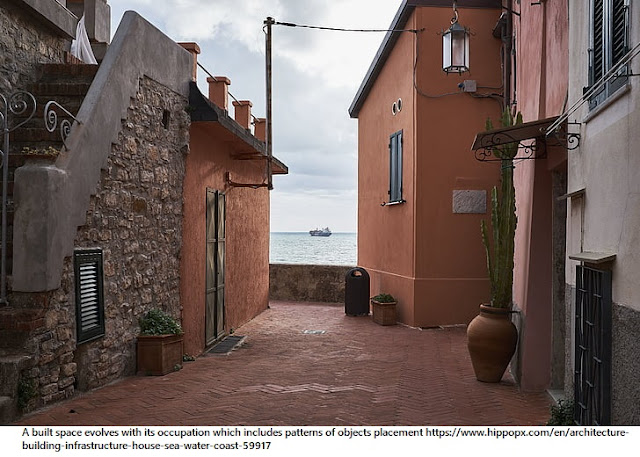Post - by Gautam Shah
.
Space is a vast expanse where Objects are space-positioned and
Happenings get time-scheduled. The objects and happenings, both
continuously shift in position and schedule, but relative to each other.
In this sense a space is a matrix of relationships. Space Perception is
becoming aware of such a matrix.
 |
| Vast Space : Algerian Nomads Habitat |
The matrix of relationships manifests in the environment, where both
the space and perceiver exist. Perception of space is also becoming
aware of the environment, organisms and objects. The causative
factors of the environment are seen as a change in the space. We
perceive the changes through the sensorial nodes of the body.
All sensorial perceptions involve the cognition system, which in turn result from physical or chemical stimulation of the sense organs. For a given event thousands of nerve impulses are generated and conducted along many different nerve fibres, but at slightly different times to the central nervous system. They form a pattern of input to the central nervous system. How we interpret the sensations is affected by subject variables such as our expectations, feelings, state of health and fitness, age, abilities etc.
 |
| Flight Simulator Duplicating Space experience |
The process of perception reveals how the environment is formatted,
organized and represented in time and space. Environment helps in
identification, and interpretation of the space, and so gives a measure
to it. The measures are perceived because we have different types
nodes of perception, where some have multiple and directional
locations. The nodes also have a range bound capacity, beyond and
under which the reception gets transferred to other systems, or ceases
to be operative. With these operants’ one gets a sense of scale, size,
gradations like concentration and diffusion, framing, juxtaposing,
referencing, linkages, details and orientation.
Perception also involves forming expectations, directing the attention,
learning and memory retention. At some level perception is recognizing
a thought, intuition, deduction, etc.
Perception occurs mainly through sensorial faculties. The faculties have
natural or nominal capacities, but some enhanced abilities also occur
through learning, motivation, experience. We have also means to
extend the capacities through various means of reach (e.g. spectacles,
hearing aids, insulators). We also develop proficiency to convert (such
as enhance, diffuse, hasten, delay) the nominal perception through
condensation, compression, enlargements, focussing, differentiation, etc.
There are some realizations that may not be attributed to sensorial
nodes. Such non sensorial perceptions makes us aware of orientations
(such as North, East, West, South, Up, Down, Front, Back), movements,
acceleration-deceleration, energy flows, gravity, etc.
| Plaza Boston Planning a Space |
There are realizations that do not relate to physical perceptions, but
are sometimes attributed to psychical experiences. These include
empathy, sympathy, links or relationships between two objects and
organisms, acknowledgement, familiarity, recollection of past events,
fore-sightings, future purposes or utilities of objects and situations,
order in complex situations, hierarchies in multiple entities, etc.
.
.











No comments:
Post a Comment